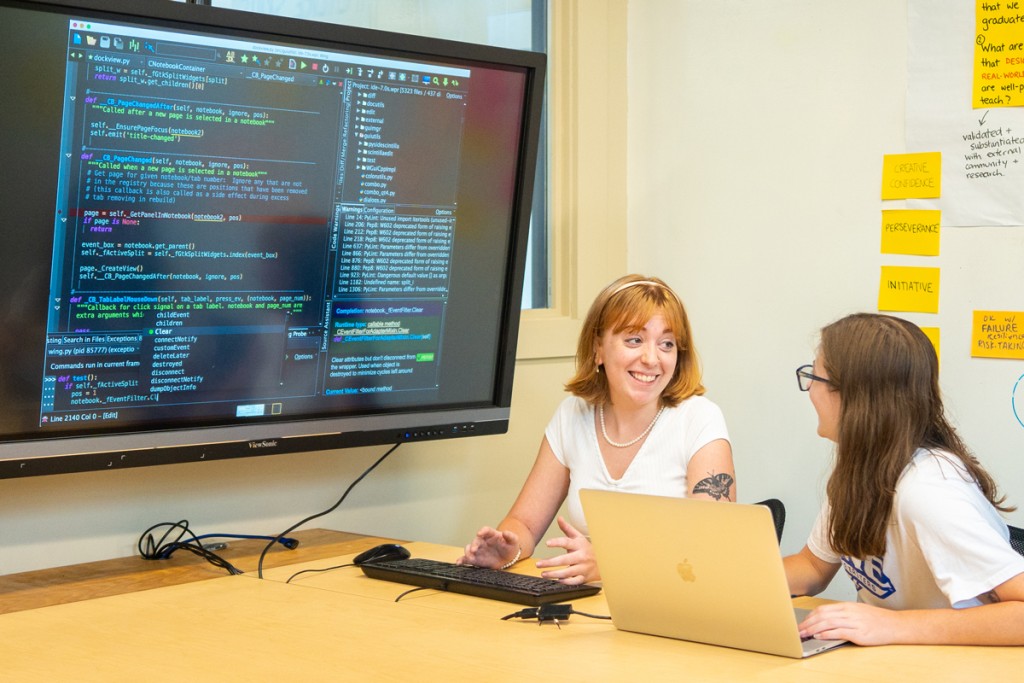Shape the Future with a Statistics Degree from UNE
If you have a flair for numbers and are driven to extract meaningful insights from data, then a Bachelor of Science in Statistics from UNE is for you. In today's data-rich world, analyzing and interpreting numbers to make informed decisions is crucial for any organization.
At UNE, you’ll develop the critical foundations of statistics using core disciplines and theory within an array of cutting-edge statistics platforms, from RStudio to Python to Tableau. You’ll learn the essential skills to bring statistics into a variety of industries like government, business, health care, and beyond.
At UNE, you’ll apply what you learn — working with faculty and students from across our degree programs on interdisciplinary projects. These projects, paired with robust, hands-on learning, will leave you well prepared to thrive in our data-driven economy, with the flexibility to work almost anywhere in this high-demand field.
Note: The Statistics degree program is available beginning in fall 2025.


Why UNE for your B.S. in Statistics
- UNE is the #1 Maine college for getting a job after graduation (Zippia, 2023)
- Become part of a workforce expected to grow by 33% over the next nine years (U.S. Bureau of Labor Statistics, 2023)
- Graduate with the ability to work in a wide range of organizations, from tech companies, healthcare organizations, and manufacturing to environmental and nonprofit organizations
- Master the foundations of statistics from Probability Theory to Critical Thinking and Interpretation
- Tap into emerging technologies, including machine learning and simulation
- UNE’s School of Computer Science and Data Analytics is led by expert faculty renowned in the field
- In our Office of Innovation you bring the power of statistics alive with exciting interdisciplinary projects, usings innovations such as artificial intelligence.
What will you study? Statistics Degree Curriculum Overview
Our program will prepare you to work in just about any field of statistics, developing solutions in a variety of statistics platforms. You’ll apply it all using statistical theory and programming with an eye toward ethical data use. You’ll immerse yourself in courses like:
Principles of Study Design
An introduction to the design of observational studies and experiments. Topics include sampling techniques, major experimental and treatment design structures, power and sample size considerations, and analysis of variance.
Statistical Computing
Computational techniques for data management, cleaning, and processing. Topics include imputation, data reduction and feature engineering, variable transformations, data wrangling, writing scripts and functions, setting up and working with databases, and working with text, spatial, and time/date data.
Series and Multivariate Calculus
Combines content from Calculus 2 and Calculus 3 in a traditional calculus sequence. Topics include sequences and series, convergence, limits, continuity, derivatives, and integrals of real valued functions of several variables.
Probability and Inference 1
This course is an introduction to the mathematical analysis, probabilistic modeling, and computer simulation of random events and processes. Topics include continuous and discrete random variables and probability distributions, parametric families, moment-generating functions, and limit theorems.
Statistical Consulting
Students act as consultants with a partner from science, health, business, industry, government, or public service, and they complete at least one end-to-end project.

Career Paths for Statistics Majors
- Actuarial Associate
- Clinical Trial Statistician
- Data Scientist
- Market/Forecast Analyst
- Natural Science ManagerRisk Analyst
- Operations Research Analyst
- Predictive Modeler
- Research Assistant
- Statistical Assistant
- Survey Researcher
- Underwriting Analyst
Statistics Careers by the Numbers
National average salary for statisticians
Projected job market growth for statisticians for 2019–2029
Job openings in the next decade
Experiential Learning in the Bachelor's Degree in Statistics Program
Research Opportunities for Statistics Majors
Imagine using your statistical talents to help medical care become more efficient, improve business plans, or push the boundaries of statistical theory. With the University of New England’s Statistics degree program in Maine, you’ll work closely with students and faculty from other disciplines on important, project-based research that can have an immediate effect.
Projects will include:
- Collaborate with the Westbrook College of Health Professions around the design of studies and the statistical analysis of medical data.
- Work closely with the College of Business in increasingly quantitative programs in areas such as Finance and Accounting that require statistics.

Internships for Statistics Majors
Internships provide critical training and work experience. They help you explore career options and often lead to jobs after graduation.
UNE will offer Statistics students immersive internships. You’ll have the opportunity to gain real-world experience with a broad range of companies, nonprofits, government agencies, and other organizations under the mentorship of statistics experts.
Examples of potential internship positions include:
- Biostatistics
- Consulting Internships
- Data Analysis
- Environmental Internships
- Financial Analysis
- Government Internships
- Market Research
- Machine Learning
- Social Science Research
- Software Development
Statistics Program Admissions Information
The Statistics program will be available beginning in fall 2025. For admissions information, please contact the Office of Undergraduate Admissions at (207) 602-2847 or admissions@une.edu.
